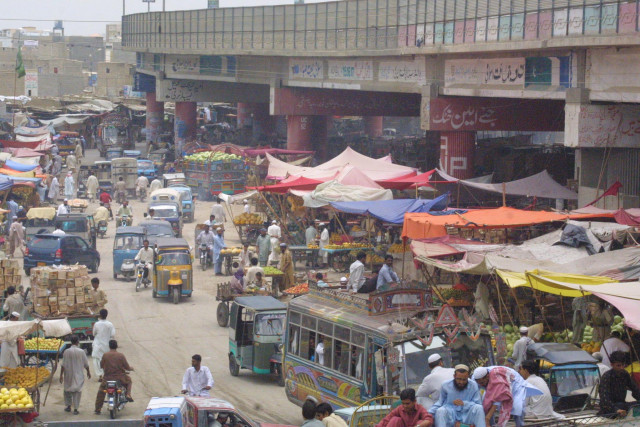Made-in-China flyover fix could work wonders for Karachi’s ‘dead’ spaces
Greenways with streams, landscaping and greenery improved life for Guangzhou’s residents.

Flyovers are the urban equivalent of an insult in the age of mass transit. The one that crouches over Banaras Chowk in Karachi sends this message loud and clear; we will build over you and just ignore what happens below.
Karachi’s appetite for flyovers grew post-2001 and today it has about 46 of these structures with four more in the pipeline at a price tag of Rs1 billion. Whether they have eased Karachi’s traffic problems is debatable but this much is clear: flyovers come with the creation of what some people see as ‘dead’ space underneath. It is here that Karachi could learn a thing or two from Guangzhou, a port city in China with a population of 16 million, whose city government has breathed life into what were hellish corridors under flyovers.
The greenway
Ahead of the Asian Games, Guangzhou decided to clean up its act. It had to do something to tackle the polluted and smelly Donghaochong creek that ran under a flyover through the city centre. Shacks and litter had sprung up along its banks. The water was cleaned up, the entire area under the flyover was landscaped and greenery, benches, play areas, gym equipment and wading ponds were created. The greenway was born.
A greenway is simply a strip dedicated to walking, cycling and recreation and can be set aside along a river, creek, lake, road, disused railway track or under a flyover. In Guangzhou, they developed 1,000km of greenways in 2010 and havesince added 1,100km more. The results are spectacular. New York and other cities around the world have also used this formula.
Today at Guangzhou’s Donghaochong greenway, grandparents come to do Tai Chi, babysit or play checkers. Workers come by for lunch breaks or in the evening entire families escape their flats to just relax with their feet dangling in the babbling brook against a backdrop of cool greenery.
An estimated $5 billion is being spent province-wide as China has recognised that its cities are expanding and economic growth had brought about environmental degradation and compromised the quality of living in its dense neighbourhoods.
Spatial justice has to be done for the people who live and work and make the cities what they are. The general consensus is that greenways have improved living conditions for residents, made it safer to walk and cycle, increased surrounding land value by up to 30% and lowered carbon dioxide emissions.
The beauty of Guangzhou’s greenways is that people respect this public space. But any resident of Karachi will be quick to point out their skepticism that even if the government miraculously executed such a project at, say a spot like Banaras, the people would destroy it (paan spitting, garbage dumping, urinating, graffiti).
Guangzhou faced the same problem. Parking expert Bram van Ooijen, who has worked with the Chinese government on a bike-sharing project for the greenways in Guangzhou, explained that because Donghaochong creek is such a high-profile project, the city government has employed cleaners and security guards there. CCTV cameras are installed along the canal as well, to prevent vandalism, theft and other serious crimes, especially at nighttime.
Van Ooijen, who works with the Institute of Transportation and Development Policy, stresses that it is all about political will to maintain a greenway. “You cannot expect all people to change their behaviour on your site, but you have means to enforce it,” he told The Express Tribune over email on Tuesday. “And people will understand: if the place is dirty and run-down, people don’t feel the need to behave properly: it’s an ugly place already anyway. But if it’s beautiful and well kept (and people [are] watching you), you will feel bad about misbehaving.”
A sense ofownership helps. One solution would be to beautify a place with the people who live directly around that area. Would it not be possible to get Awami National Party leaders around Bacha Khan and Banaras to enlist unemployed men to help landscape and rehabilitate the area underneath the flyover? Surely some order could be arranged for the fruit sellers who have taken up the space – if this is considered a good idea. Perhaps benches and tea stalls could be set up.
Greenways in Guangzhou created an estimated 300,000 jobs. Subsequent upkeep and maintenance could also create further jobs. And it is not as if the Muttahida Qaumi Movement has not demonstrated this formula works: simply consider the beautiful Bagh Ibn-e-Qasim where guards, gardeners and maintenance staff have managed to keep this huge green space an evening getaway for inner-city families.
Political will is obviously needed at some point along the trajectory and in Guangzhou theparty’s secretary Wang Yang was instrumental in pushing it forward. As if understanding this phenomenon, the Sindh High Court ordered the city government on Tuesday to remove the encroachments under the Shaheed-e-Millat flyover and consider building a park there.
Published in The Express Tribune, July 30th, 2012.



















COMMENTS
Comments are moderated and generally will be posted if they are on-topic and not abusive.
For more information, please see our Comments FAQ